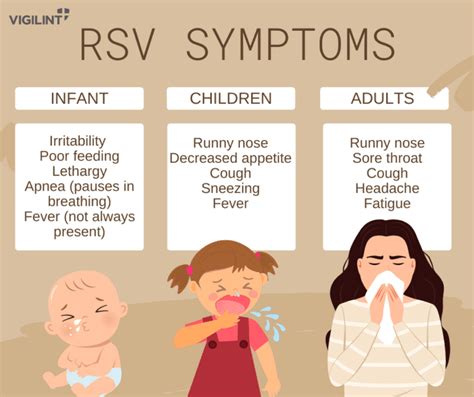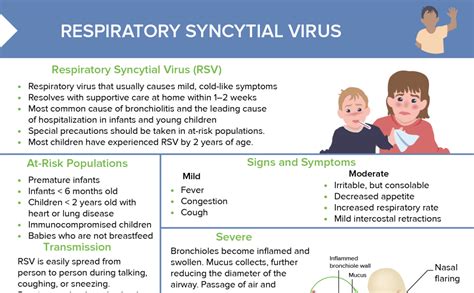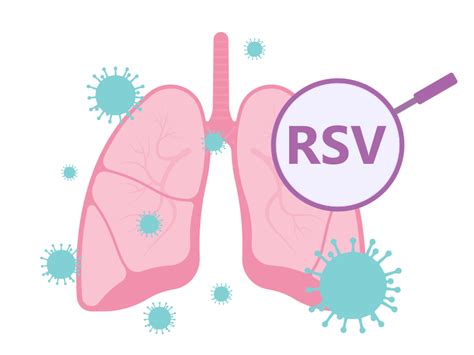Intro
Discover RSV virus symptoms in adults, including respiratory issues, cough, and fatigue. Learn about diagnosis, treatment, and prevention of Respiratory Syncytial Virus infections.
The respiratory syncytial virus (RSV) is a highly contagious virus that affects people of all ages, but it is most commonly associated with respiratory illnesses in young children and older adults. However, RSV can also cause significant symptoms in adults, particularly those with weakened immune systems or underlying health conditions. Understanding the symptoms of RSV in adults is crucial for early detection, proper treatment, and prevention of complications.
RSV is a common virus that spreads through respiratory droplets, contact with contaminated surfaces, and close contact with an infected person. In adults, RSV symptoms can range from mild to severe, and they may resemble those of the common cold or flu. Some of the common symptoms of RSV in adults include runny nose, coughing, sneezing, headache, and fatigue. In severe cases, RSV can cause pneumonia, bronchiolitis, and other respiratory complications, especially in older adults or those with underlying health conditions.
The importance of recognizing RSV symptoms in adults cannot be overstated. Early detection and treatment can help alleviate symptoms, prevent complications, and reduce the risk of transmission to others. Moreover, understanding the symptoms of RSV in adults can help healthcare professionals develop effective treatment plans and provide guidance on prevention and management. In this article, we will delve into the symptoms of RSV in adults, discuss the risk factors, and provide information on diagnosis, treatment, and prevention.
Understanding RSV Symptoms in Adults

RSV symptoms in adults can be similar to those of other respiratory viruses, making diagnosis challenging. However, there are some distinct characteristics of RSV symptoms that can help healthcare professionals make an accurate diagnosis. Some of the common symptoms of RSV in adults include:
- Runny nose and congestion
- Coughing and sneezing
- Headache and fatigue
- Sore throat and hoarseness
- Wheezing and shortness of breath
- Chest pain and tightness
In severe cases, RSV can cause pneumonia, bronchiolitis, and other respiratory complications, especially in older adults or those with underlying health conditions. It is essential to seek medical attention immediately if you experience any of the following symptoms:
- Difficulty breathing or shortness of breath
- Chest pain or tightness
- Severe headache or confusion
- Fever above 102°F (39°C)
- Vomiting or diarrhea
Risk Factors for RSV in Adults
Certain groups of adults are at higher risk of developing severe RSV symptoms, including:- Older adults (65 years and older)
- Young adults with weakened immune systems (e.g., those with HIV/AIDS, cancer, or taking immunosuppressive medications)
- Adults with underlying health conditions (e.g., chronic obstructive pulmonary disease (COPD), asthma, or heart disease)
- Pregnant women
- Adults with neurological disorders (e.g., multiple sclerosis, muscular dystrophy)
Diagnosis and Treatment of RSV in Adults

Diagnosing RSV in adults can be challenging, as the symptoms are similar to those of other respiratory viruses. Healthcare professionals may use a combination of physical examination, medical history, and laboratory tests to diagnose RSV. Some of the common diagnostic tests include:
- Rapid antigen detection tests
- Polymerase chain reaction (PCR) tests
- Chest X-rays or computed tomography (CT) scans
Treatment for RSV in adults typically focuses on alleviating symptoms and preventing complications. Some of the common treatments include:
- Over-the-counter medications (e.g., pain relievers, decongestants, and cough suppressants)
- Prescription medications (e.g., bronchodilators, corticosteroids, and antiviral medications)
- Oxygen therapy and respiratory support
- Hospitalization and intensive care unit (ICU) admission in severe cases
Prevention and Management of RSV in Adults
Preventing the spread of RSV is crucial, especially in high-risk groups. Some of the ways to prevent RSV transmission include:- Practicing good hygiene (e.g., washing hands frequently, avoiding close contact with infected individuals)
- Avoiding sharing utensils, towels, and other personal items
- Staying home from work or school when symptoms appear
- Getting vaccinated against flu and other respiratory viruses
- Avoiding smoking and secondhand smoke
Managing RSV symptoms in adults requires a comprehensive approach that includes:
- Staying hydrated and getting plenty of rest
- Using over-the-counter medications to alleviate symptoms
- Practicing good hygiene and avoiding close contact with others
- Seeking medical attention immediately if symptoms worsen or if you experience any of the severe symptoms mentioned earlier
Complications of RSV in Adults

RSV can cause significant complications in adults, especially those with underlying health conditions or weakened immune systems. Some of the common complications include:
- Pneumonia: RSV can cause pneumonia, which can be severe and life-threatening, especially in older adults or those with underlying health conditions.
- Bronchiolitis: RSV can cause bronchiolitis, which is an inflammation of the small airways in the lungs.
- Respiratory failure: RSV can cause respiratory failure, which requires oxygen therapy and respiratory support.
- Cardiac complications: RSV can cause cardiac complications, such as heart failure and arrhythmias, especially in adults with underlying heart disease.
Long-term Effects of RSV in Adults
RSV can have long-term effects on adults, especially those with underlying health conditions or weakened immune systems. Some of the common long-term effects include:- Chronic respiratory disease: RSV can cause chronic respiratory disease, such as COPD and asthma.
- Cardiovascular disease: RSV can increase the risk of cardiovascular disease, especially in adults with underlying heart disease.
- Neurological disorders: RSV can cause neurological disorders, such as multiple sclerosis and muscular dystrophy.
Current Research and Developments

Current research is focused on developing effective treatments and prevention strategies for RSV in adults. Some of the ongoing research includes:
- Development of RSV vaccines: Researchers are working on developing RSV vaccines that can provide long-term protection against the virus.
- Antiviral medications: Researchers are developing antiviral medications that can effectively treat RSV infections in adults.
- Immunotherapy: Researchers are exploring immunotherapy as a potential treatment for RSV in adults, especially those with weakened immune systems.
Future Directions
Future research directions for RSV in adults include:- Developing more effective diagnostic tests
- Identifying new treatments and prevention strategies
- Understanding the long-term effects of RSV on adults
- Developing public health campaigns to raise awareness about RSV and its prevention
What are the common symptoms of RSV in adults?
+The common symptoms of RSV in adults include runny nose, coughing, sneezing, headache, and fatigue. In severe cases, RSV can cause pneumonia, bronchiolitis, and other respiratory complications.
How is RSV diagnosed in adults?
+Diagnosing RSV in adults can be challenging, as the symptoms are similar to those of other respiratory viruses. Healthcare professionals may use a combination of physical examination, medical history, and laboratory tests to diagnose RSV.
What are the complications of RSV in adults?
+RSV can cause significant complications in adults, especially those with underlying health conditions or weakened immune systems. Some of the common complications include pneumonia, bronchiolitis, respiratory failure, and cardiac complications.
In conclusion, RSV is a significant public health concern that affects people of all ages, including adults. Understanding the symptoms, risk factors, diagnosis, treatment, and prevention of RSV in adults is crucial for early detection, proper treatment, and prevention of complications. By staying informed and taking preventive measures, adults can reduce their risk of developing severe RSV symptoms and transmission to others. If you have any questions or concerns about RSV, please share them in the comments below, and we will do our best to provide you with accurate and helpful information.
